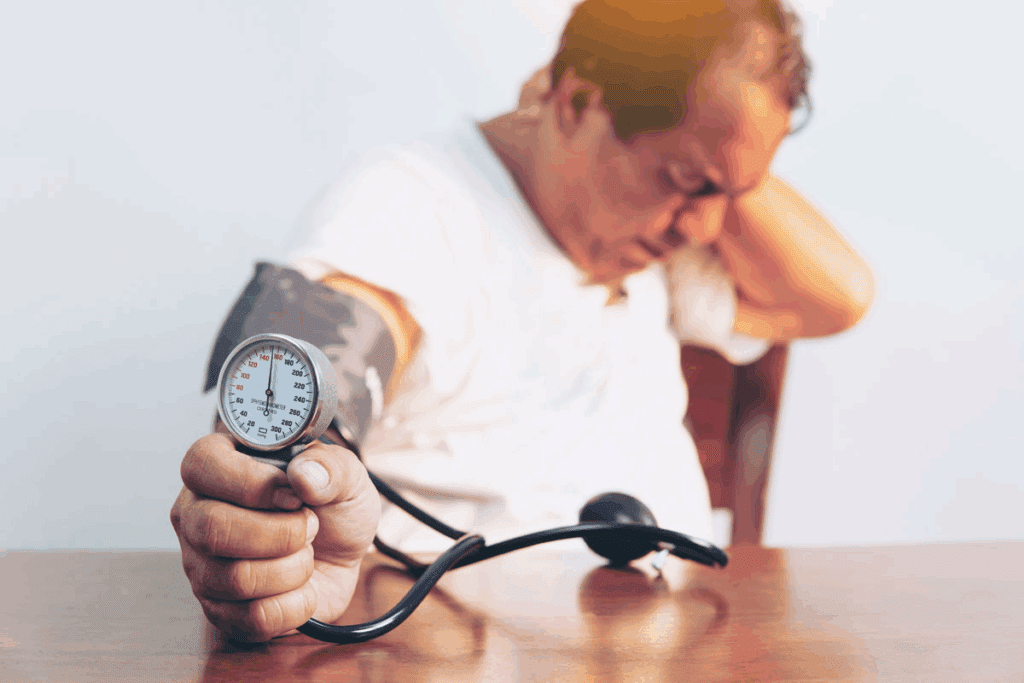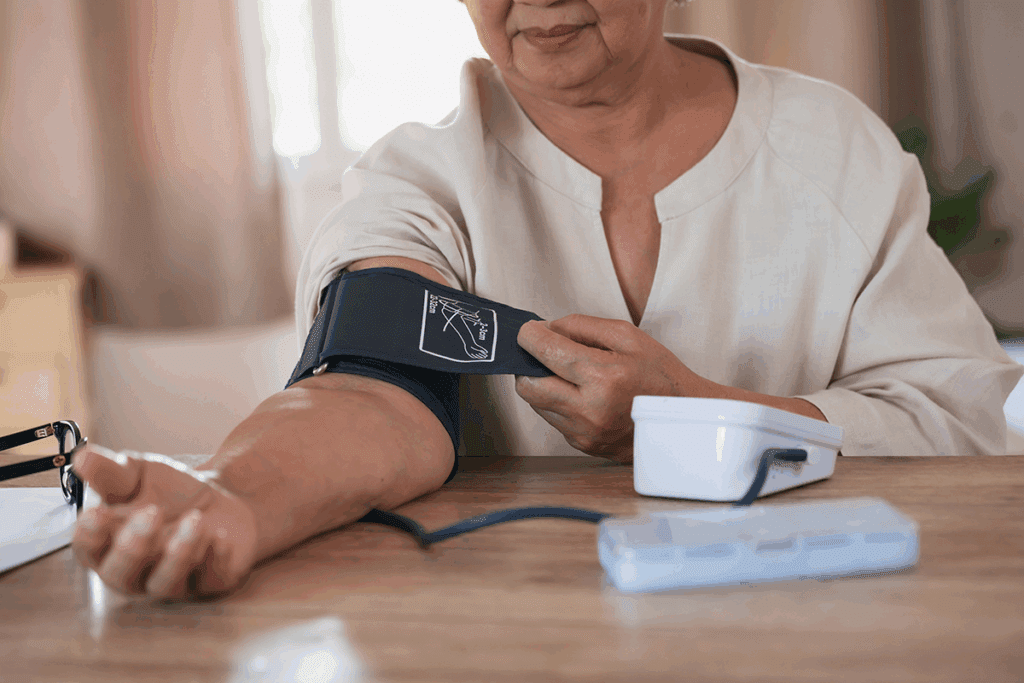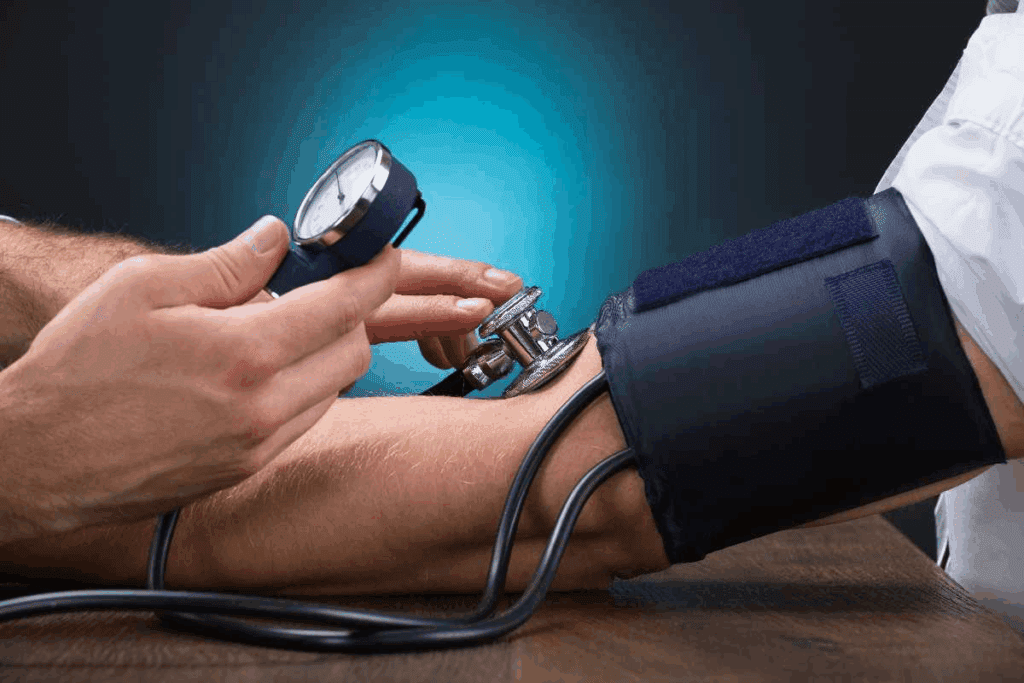
Feeling worried about temporary elevated blood pressure or blood pressure spiking randomly is normal. At Liv Hospital, we get how scary sudden bp spikes can be.
Learn what can cause a sudden increase in blood pressure and how to manage spikes.
High blood pressure is often called the “silent killer” because it doesn’t show symptoms. But, sudden increases in blood pressure can happen for many reasons. Knowing these reasons is key to managing and preventing it.
We know how important it is to tackle causes of sudden blood pressure increase. We’re dedicated to giving care that meets international standards. Our goal is to help those with temporary high blood pressure get the right care fast.

It’s important to know about temporary high blood pressure to keep your heart healthy. Blood pressure changes all day because of different things. But, big jumps can mean you might have a health problem.
A blood pressure spike is when your blood pressure goes up a lot quickly. It’s measured in millimeters of mercury (mmHg). It shows two numbers: the top number (systolic) and the bottom number (diastolic). A normal reading is under 120/80 mmHg.
Elevated blood pressure is between 120 and 129 for systolic and under 80 for diastolic.
The American Heart Association has set blood pressure categories:
| Blood Pressure Category | Systolic mmHg | Diastolic mmHg |
| Normal | Less than 120 | Less than 80 |
| Elevated | 120-129 | Less than 80 |
| Stage 1 Hypertension | 130-139 | 80-89 |
| Stage 2 Hypertension | 140 or higher | 90 or higher |
Blood pressure can change for many reasons, like stress or moving. But, big spikes that are too high or cause symptoms like headaches are a worry.
“Blood pressure variability is a complex phenomenon influenced by multiple factors, including environmental, physiological, and pathological elements.”
— Medical Expert, Hypertension Specialist
Getting your blood pressure right is key to managing high blood pressure. Here’s how:
Knowing what a blood pressure spike is and how to measure it right helps you take care of your heart. It also tells you when to see a doctor.

Blood pressure can spike suddenly, and knowing why is key to staying healthy. Many things can cause these sudden increases. Some are temporary and harmless, while others are more serious.
Blood pressure is controlled by the heart, blood vessels, and nerves. Sudden spikes in blood pressure happen when this system gets out of balance. This can be due to many reasons, both inside and outside the body.
The body’s “fight or flight” response is a big player in blood pressure control. When we feel stressed or scared, this response kicks in, raising blood pressure. While it’s meant to be short-lived, constant stress can lead to frequent spikes.
Many everyday things can cause blood pressure to jump up suddenly. These include:
Even healthy people can see blood pressure changes throughout the day. This can be due to many things like exercise, mood, or the environment. While occasional spikes are usually okay, frequent or severe ones might mean there’s a bigger problem.
It’s important to know why blood pressure spikes to manage high blood pressure and keep the heart healthy. By finding and dealing with the causes, people can lower their risk of serious heart problems.
The link between stress, emotions, and blood pressure is complex. Stress and emotions can raise blood pressure, causing short but sharp increases.
Anxiety and panic attacks can raise blood pressure. When we feel anxious, our body’s “fight or flight” response kicks in. This releases stress hormones like adrenaline, making our heart beat faster and blood vessels narrower.
Managing anxiety is key to lowering blood pressure. Deep breathing, meditation, and therapy can help lessen anxiety and panic attacks.
Stress from personal, work, or social issues can also raise blood pressure. Our body reacts to emotional stress like it does to physical threats, releasing stress hormones.
White coat hypertension is when blood pressure goes up in a doctor’s office. It’s often due to anxiety or stress from being in a medical setting. While it’s not a long-term problem, it can lead to wrong diagnoses and worry.
Diagnosing white coat hypertension usually involves checking blood pressure outside a doctor’s office. This can be done with ambulatory blood pressure monitoring (ABPM) or home blood pressure monitoring.
Understanding and tackling emotional and stress-related blood pressure spikes can help manage blood pressure. This can lower the risk of developing hypertension.
Our daily habits and what we consume can greatly affect our blood pressure. Things like diet, exercise, and substance use are key to our heart health.
Caffeine is in coffee, tea, chocolate, and some meds. It can raise blood pressure because it stimulates the heart and blood vessels. Moderate caffeine use is usually okay, but too much can really raise blood pressure.
A study in the Journal of the American Heart Association found caffeine can quickly raise blood pressure. But, it’s not clear yet how it affects blood pressure over time.
Using tobacco and nicotine is a big risk for heart disease, including high blood pressure. Nicotine speeds up the heart and raises blood pressure. Nicotine’s quick effects on the heart can be very dangerous for people with heart problems.
Drinking alcohol can affect blood pressure in both short and long terms. While some people might not see a big change in blood pressure from moderate drinking, too much can cause high blood pressure that lasts. It’s important to know how much is safe and how alcohol affects you.
Dehydration happens when we lose more fluids than we take in, upsetting the balance. It can lower blood volume, causing blood pressure to rise as the body tries to make up for it. Drinking enough water is key to keeping blood volume right and heart health.
To avoid dehydration, it’s good to:
By watching these lifestyle and consumption factors, we can take steps to control our blood pressure and lower the risk of high blood pressure.
Certain medications can suddenly raise blood pressure, which is a serious issue. It’s important to know how different drugs can affect our blood pressure. This knowledge helps us manage and prevent sudden spikes.
Decongestants help with nasal congestion from colds or allergies. But, they can also raise blood pressure. Pseudoephedrine and phenylephrine in these drugs can narrow blood vessels, increasing pressure. If you have high blood pressure, talk to your doctor before using these.
Examples of decongestants that may affect blood pressure:
NSAIDs are used for pain and to reduce swelling. But, they can also raise blood pressure. They affect the kidneys and fluid balance in the body. Use NSAIDs carefully and only as directed by a doctor, if you have high blood pressure.
| NSAID | Common Use | Potential Effect on Blood Pressure |
| Ibuprofen (Advil, Motrin) | Pain relief, inflammation reduction | May cause fluid retention, increasing blood pressure |
| Naproxen (Aleve) | Pain relief, arthritis treatment | Can affect kidney function, potentially raising blood pressure |
Many prescription drugs can change blood pressure. For example, some antidepressants, oral steroids, and ADHD medications can cause blood pressure to go up and down. It’s important to check your blood pressure regularly if you’re taking these.
Examples of prescription drugs that may affect blood pressure:
To manage blood pressure spikes from medications, know the side effects of your drugs. Work closely with your doctor. Regular checks and adjusting your treatment can help avoid these problems.
Physical and physiological factors can cause sudden spikes in blood pressure. These are important for people who have temporary high blood pressure. This can happen due to physical conditions or activities.
A full bladder can make blood pressure go up. This is because the body reacts to it. When the bladder is full, it can make the nervous system work harder. This can lead to blood vessels narrowing and blood pressure rising. Relieving oneself can help normalize blood pressure.
Physical pain and discomfort can also raise blood pressure. Pain can make the body’s stress response kick in. This releases hormones like adrenaline, which can make blood vessels constrict. Managing pain well is key to avoiding these spikes.
Doing strenuous activities or exercise can also raise blood pressure. When you’re doing intense physical work, your heart beats faster. Blood vessels also widen to give more oxygen to muscles. While exercise is good for your heart, watching your blood pressure during and after is important.
Some key factors to consider when managing physical and physiological triggers include:
By understanding and managing these physical and physiological factors, individuals can better control their blood pressure. This can help reduce the risk of temporary spikes.
What we eat greatly affects our blood pressure. Some foods can make it spike suddenly. Our diet has many parts that can either help or harm our heart health.
Tyramine is found in aged, fermented, or spoiled foods. It can raise blood pressure, mainly for those on MAOIs. Foods like aged cheeses, fermented soy, and some wines are high in tyramine. People sensitive to tyramine should avoid these to prevent sudden blood pressure increases.
A medical expert says, “Tyramine-rich foods are a big problem for people with certain health issues or on specific meds.”
Too much salt can lead to high blood pressure. It causes fluid buildup and increases blood volume. Processed foods are often salty, making it hard to stay within sodium limits. Those who are salt-sensitive are more likely to see their blood pressure rise with sodium.
Lowering sodium intake can help control blood pressure. The American Heart Association suggests no more than 2,300 milligrams of sodium daily. For most adults, the goal is 1,500 milligrams.
Other foods can also affect blood pressure. Caffeine, for example, can temporarily raise blood pressure. Its long-term effects are more complex and vary by person. A diet lacking nutrients like potassium can also disrupt blood pressure.
Eating a balanced diet with fruits, veggies, whole grains, and lean proteins can help. It’s also good to watch portion sizes and cut down on processed and salty foods.
Many health issues can cause sudden blood pressure increases. Certain medical problems can disrupt how the body controls blood pressure. This can lead to temporary high readings.
Thyroid problems, like hyperthyroidism, can greatly affect blood pressure. An overactive thyroid gland can increase heart rate and blood pressure. It’s important to manage thyroid health to keep blood pressure stable.
Issues with the adrenal glands, like pheochromocytoma, can lead to high blood pressure. These glands release too much adrenaline, causing sudden blood pressure spikes. It’s key to diagnose and treat adrenal gland problems to control blood pressure.
Hormonal changes can also impact blood pressure. For example, hormonal shifts during menopause or pregnancy can cause high blood pressure. Keeping hormonal balances in check can help manage these effects.
Kidney disease can also affect blood pressure. Kidneys help regulate blood pressure by managing fluid balance and hormone secretion. If kidneys aren’t working right, blood pressure can rise. Managing kidney health through lifestyle changes and treatment can help control blood pressure.
It’s important to understand and manage health conditions to prevent sudden blood pressure spikes. By addressing these issues, people can lower their risk of hypertension and heart problems.
Knowing when to get medical help and how to prevent blood pressure spikes is key to staying healthy. We’ve talked about what causes sudden spikes, like stress and lifestyle choices. We also looked at health conditions that can lead to these spikes.
Managing blood pressure well means regular checks and making lifestyle changes. It’s important to know the signs of severe high blood pressure. If you see a sudden spike, acting fast can stop bigger problems.
Preventing blood pressure spikes involves eating right, managing stress, and staying active. These habits help keep your blood pressure stable and your heart healthy.
Don’t wait to take care of your health. If you often or severely experience blood pressure spikes, see a doctor. They can find the cause and help you manage it.
A sudden spike in blood pressure is a quick and big jump in blood pressure. It can happen for many reasons. These include stress, some medicines, and health problems.
Yes, anxiety and panic attacks can make blood pressure go up fast. This is because stress hormones like adrenaline are released.
Caffeine can make blood pressure go up for a while. This is because it makes the heart and blood vessels work harder.
White coat hypertension is when blood pressure is higher in a doctor’s office. This often happens because of stress or anxiety from being in a medical setting.
Yes, some foods like those with tyramine and high-sodium can make blood pressure go up in some people.
Dehydration can make blood pressure go up. This is because less blood is in the body, making the blood more concentrated and increasing pressure.
Yes, health issues like thyroid problems, adrenal gland issues, hormonal imbalances, and kidney disease can cause sudden blood pressure spikes.
Managing stress can help lower blood pressure. Techniques like deep breathing, meditation, or yoga can be helpful.
Certain medicines, like over-the-counter decongestants, NSAIDs, and some prescription drugs, can make blood pressure go up.
To prevent blood pressure spikes, live a healthy lifestyle. This includes eating well, exercising, managing stress, and checking blood pressure often.
See a doctor if you have frequent or severe blood pressure spikes. Or if you have health issues that might be causing them.
Yes, changing your lifestyle can help. This includes eating less sodium, eating more potassium-rich foods, exercising, and managing stress.
Blood pressure spikes can be a sign of temporary hypertension. This is when blood pressure goes up temporarily and significantly.
To measure blood pressure right, use a good blood pressure monitor. Take several readings and follow the right steps. Sit comfortably and avoid caffeine and exercise before measuring.
World Health Organization. (2025). 13 Causes of Sudden Blood Pressure Spikes Temporary. Retrieved from https://www.who.int/news-room/fact-sheets/detail/hypertension>
Subscribe to our e-newsletter to stay informed about the latest innovations in the world of health and exclusive offers!
WhatsApp us